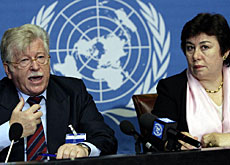“Switzerland must address migration needs”

Switzerland's top aid official says the country is losing sight of its future needs for migrant workers ahead of a referendum on tougher foreigner and asylum laws.
Walter Fust, head of the Swiss Agency for Development and Cooperation (SDC), voiced his concerns during the publication of a United Nations report on women and international migration.
Speaking in Geneva on Wednesday, Fust said he was duty bound to support the government, which wants voters to approve tougher legislation on foreigners and asylum on September 24.
But he acknowledged that there were arguments on both sides of the debate that he disagreed with, adding that there were “concerns from an international development point of view”.
The new foreigners law would give preferential status to citizens from countries of the European Union and the European Free Trade Association (Efta). While under the revised asylum law, those who fail to present identity papers within 48 hours would be expelled and admission on humanitarian grounds scrapped.
Fust warned that the issue of migration had become enmeshed with the asylum debate at a time when Switzerland, with its ageing population, should be urgently considering future employment needs.
“It is unfortunate that the necessity of migration is not being looked at in a positive manner. If we want to keep Switzerland wealthy and the economy healthy, we need migration and it is time for our citizens to know this,” he told swissinfo.
Rights violations
Publishing its report – A Passage to Hope: Women and International Migration – the UN Population Fund (UNFPA) called on governments to do more to prevent human rights violations against the world’s 95 million women migrants.
The report noted that trafficking victims and domestic workers are especially vulnerable to exploitation and abuse.
It is estimated that up to 1.2 million people are trafficked every year, mostly for the sex industry. Of these up to 80 per cent are female.
According to the UNFPA, human trafficking is now the third-most lucrative trade after drugs and arms smuggling, and nets an estimated $7-12 billion (SFr8.7-14.9 billion) annually.
“Increasingly restrictive immigration policies limit the possibility of legal entry, which is in turn driving more and more would-be migrants to unwittingly entrust themselves to traffickers,” said the report.
Human trafficking
Fust said Switzerland was itself guilty of a “double-standard” on the issue of so-called cabaret dancers and that this needed addressing at a political level. A recent study by the Swiss Forum for Migration and Population Studies found that many were being sexually exploited.
“Regarding the terrible issue of human trafficking, there are different standards of perception and even different moral standards, and I think sooner or later this has to be addressed by politicians,” he said.
“We cannot just tolerate [the situation] when we see that these services in the sex industry are delivered by trafficked women. This falls short of human rights standards, protection and even our laws.”
Fust said greater efforts were now needed to manage migration properly and develop long-term solutions to the problem.
This meant doing more to reduce poverty, attract investment and boost job creation in developing countries.
“If there is no job creation in those countries, what are the prospects for young people?”
swissinfo, Adam Beaumont in Geneva

More
Swiss Agency for Development and Cooperation (SDC)
68% of health workers in Zimbabwe want to move abroad.
Only 19 countries – one of them Switzerland – have laws or regulations governing domestic work.
Young people aged 10-24 account for about a third of all international migrants.
The UN is due to holding a meeting on migration in New York next week.
The United Nations Population Fund says women make up almost half of all migrants worldwide – 95 million. The agency estimates that migrant women sent home $232 billion (SFr287 billion) last year.
The report says millions of women migrate from Asia, Latin America, the Caribbean and Africa to meet the demand for domestic workers in Europe, North America and the Gulf States. But it says they are rarely protected by labour laws.
According to the UN, the massive “brain drain” of medical staff to industrialised nations has left poorer countries facing an unprecedented health care crisis. It says 20,000 highly qualified nurses leave Africa every year.

In compliance with the JTI standards
More: SWI swissinfo.ch certified by the Journalism Trust Initiative











You can find an overview of ongoing debates with our journalists here . Please join us!
If you want to start a conversation about a topic raised in this article or want to report factual errors, email us at english@swissinfo.ch.